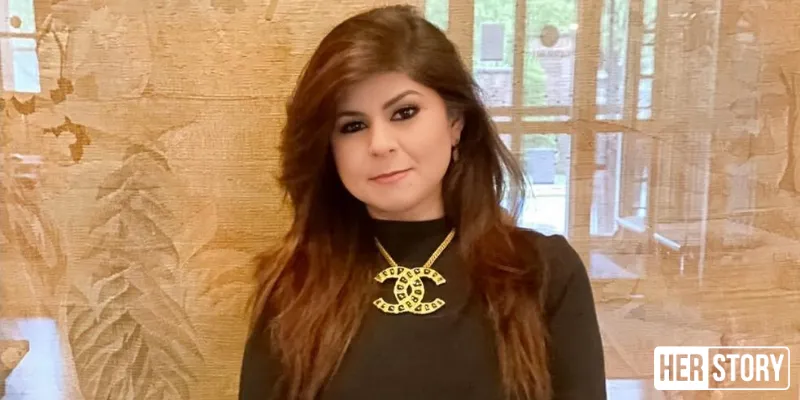This woman entrepreneur went from being door-to-door salesperson at 17 to founding million-dollar companies
At 17, Bhavna Juneja was a door-to-door salesperson selling home decor. After she moved to the US, she bought out the IT company where she worked as a receptionist. Today, she has three companies that rake in millions in revenues in the US and India.
“Rejection becomes the foundation of success for those who don’t quit,” says Bhavna Juneja, who went from being a door-to-door salesperson at 17 to a serial entrepreneur owning million-dollar businesses in the US and India. She recently co-founded an asset management company MPowered with Sudeep Singh, former CEO of GoWork in India.
Bhavna’s entrepreneurial journey, now spanning three decades, began as a teenager. Seeing her mother single-handedly work for her and her two sisters, Bhavna decided to shoulder part of the financial responsibility as well. At 16, she took up door-to-door sales of home décor items in Defence Colony, Delhi.

Bhavna Juneja went from being a 17-year-door-to-door salesperson to a serial entrepreneur with million-dollar businesses.
A year later, eager to expand her small business, Bhavna bought the ITPO’s (Indian Trade Promotion Organisation) international buyers list and faxed each and every buyer on the list to partner with them. One such buyer she contacted was US based David Dweck of SS Dweck & Sons, a Brooklyn based large importer for home-furnishings from India. When David visited India, he met with Bhavna and impressed with her entrepreneurial spirit at such a young age, he wrote a contract for her to be their agent in India. He also transferred $3000 as start up commission, which helped Bhavna establish a buying agency, Spectra Shades International that would source home-furnishings and handicrafts in bulk and export the goods to international buyers including Walmart, Kmart, JCPenney, Macy’s and Pottery Barn among others.
“Given that I was so young and raw, setting up a business at that age was quite challenging but it was also an equally rewarding experience. I came out of it much stronger, wiser and smarter and my learnings from then come in handy even today,” Bhavna tells HerStory.
After getting degrees in Science and Interior Design, Bhavna migrated to the US in 1996 where she secured her first job as an office receptionist for an IT startup.
The receptionist who bought out the company
Arriving in the US, Bhavna decided to join the IT industry although she had a degree in interior design. In a few months, she managed to convince the startup’s leadership to let her try her hands at sales. Her experience as a young salesperson had led her to discover her love and natural acumen for sales, Bhavna recalls.
“I self-learned as a receptionist about selling IT services and closed my first deal with Caterpillar. In a year’s time, I grew the company from $0 to $2 million,” Bhavna says.
In the second year she bought out the company from the owner and in the next few years, grew the company to $10 million. Since her first buy out, she has bought and invested in several more businesses that include technology, healthcare, recruitment, interiors and realty-tech sectors, among others.
Building million-dollar companies
Bhavna is also the founder of Infinity, a pharmaceutical and life sciences company, that she set up in 2013, which is a women-owned minority certified company. It is a global provider of Life Science Enterprise Level IT services for biotech, pharmaceutical and medical device companies globally. It is headquartered in Stamford, Connecticut, USA with operations in the UK, Canada and India.
She self-funded the company and later, received investment from US-based entrepreneur and investor Shelly Nichani. In just seven years, Bhavna has built a team of over 700 people across the four countries. Bhavna claims that the company rakes in annual revenues worth $35 million.
“By launching Infinity, I happily entered a space that other entrepreneurs duck due to the inevitable challenges and complications involved, and it today stands tall among the top 20 pharma companies globally. By virtue of this, I am also among the very few women globally today to head a pharmaceutical and life sciences venture,” Bhavna says.
The company has been ranked amongst 500 companies in Financial Times’ list of the America’s Fastest Growing Companies 2020, the eighth fastest growing company in Startup 50 by Canadian Business, and similar lists by Inc5000 and Stamford city.
Bhanva also simultaneously runs , an AI-based recruitment process outsourcing company headquartered in the US. Started in August 2018, with a three-member team, Vanator - which means hunter - now has over 125 people with offices in Noida and US. Bhavna claims that Vanator will touch 2 million dollars in revenue by the end of 2020.
When asked about her success mantra in leading her ventures to new heights, Bhavna believes that 3 Ps - People, Process, Passion - are the reasons for success.
In advice for aspiring entrepreneurs, she says, “Never let your dreams die. If you have a vision, make it happen no matter how many attempts it takes.”
Full circle
“India is where I first embarked on my journey as an entrepreneur and learnt many valuable lessons that helped me walk the path successfully in the US,” says Bhavna when asked about her new co-founded venture in India.
“By co-founding MPowered in India, I have come full circle and it feels great to be a part of India’s thriving startup ecosystem again.”
One of the major reasons that prompted her to venture into the asset management industry, she says, is the lack of women leaders in the real estate industry in India.
“A few successful examples are enough to encourage others to join the bandwagon and turn things around for the better,” says the co-founder of MPowered that was established in June 2020.
The Gurugram-based startup recently raised $ 21 million in pre-Series A round from a group of US-based HNIs led by serial entrepreneurs in the real-estate sector, Ashok Nichani and Shelly Nichani. Bhavna says that the funding will be used to take on new verticals of real estate including warehousing, residential, and commercial spaces.
Future plans
With several successful entrepreneurial ventures, Bhavna reveals that one of the reasons for her to invest in and set up multiple business ventures is to also use a part of the profits to fund charitable causes that she feels strongly about.
Some of her existing philanthropic initiatives include providing aid to cancer patients and setting up diabetes camps. She also wants to set up clusters of schools in India for underprivileged children, especially for girls, so that more women can be financially independent and be able to take control of their lives.
While the pandemic has limited growth opportunities this year for all her ventures, Bhavna believes the companies will bounce back as the spread of the coronavirus recedes.
“While the pandemic may have closed some doors, it has also opened up a flood of other opportunities. Specifically, for real estate, the rise of ecommerce has led to a drastic demand for warehousing especially for a business like MPowered where online brands are looking to set up last-mile warehouses to speed-up the fulfilment process for online orders. It has also led to a thumping demand for various kinds of new residential models that are greatly viable in the work-from-home scenario which many businesses will continue with, for the remainder of this year,” she says.
In the future, expansion into new geographies is the plan for all three of her businesses. For MPowered, she has plans of taking the brand to North America and expanding its service portfolio. For Infinity, the idea is to make the global footprint stronger by setting-up new offices in Japan and Poland next year. She also plans to open up more local offices for Vanator in India and take the business to Europe.
Edited by Rekha Balakrishnan





![[Funding alert] Asset manager MPowered raises $21M from US-based high net worth individuals](https://images.yourstory.com/cs/2/b87effd06a6611e9ad333f8a4777438f/Untitled-1-1592981506596.png?fm=png&auto=format&h=100&w=100&crop=entropy&fit=crop)

![[RAISE 2020] How two childhood friends are making knowledge accessible through a one-stop video localisation startup](https://images.yourstory.com/cs/2/e641e900925711e9926177f451727da9/Untitleddesign-1605526651387.png?mode=crop&crop=faces&ar=1%3A1&format=auto&w=1920&q=75)


